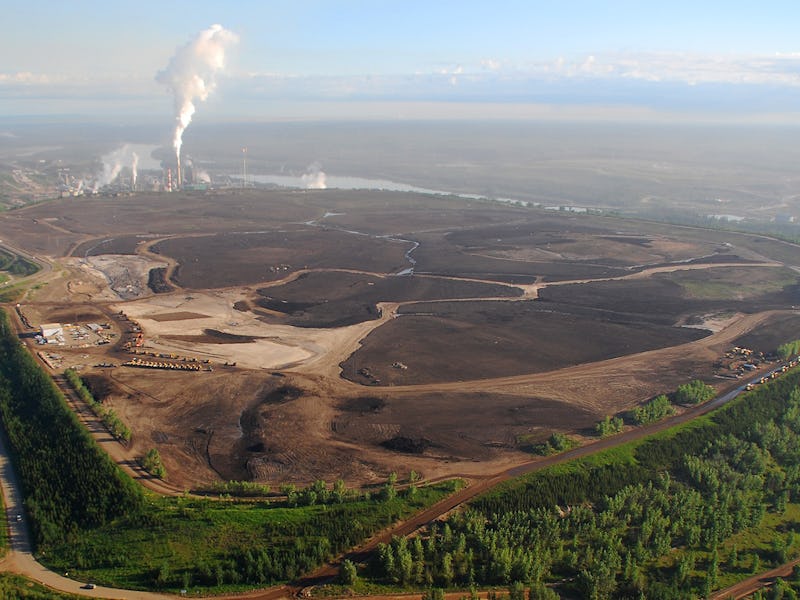At Paris Climate Talks, Canada Promises to Clean Up Its Dirty Reputation
Newly elected Prime Minister Justin Trudeau pledges to turn the country around at the COP21 climate change negotiations in Paris.

After years of bad behavior, Canada has promised to turn over a new, greener leaf. As newly elected Prime Minister Justin Trudeau announced his intentions to the world on Monday at the Paris Climate Conference: “Canada is back, my good friends. We are here to help.”
Trudeau’s position represents a 180 for a nation whose previous prime minister, Stephen Harper, was recognized climate villain in many circles. His critics say he shamelessly promoted extracting the Aberta tar sands, a particularly dirty form of fossil fuel, and stubbornly resisted any climate change action, notoriously withdrawing from the Kyoto Protocol in 2011.
The Syncrude oil sands site, on April 27, 2015 outside of Fort McMurray, Canada. Fort McMurray is currently coping with an economic downturn as a result of low oil prices and most of the layoffs have been impacting the transient workforce. Canada's oil and gas industry is expected to lose 37 percent of its revenues in 2015.
These blights on Canada’s reputation as America’s friendly neighbor to the north have been a source of shame for many Canadians. The country’s international reputation got so bad that even the conventional wisdom of sewing a red maple leaf flag on your backpack while traveling (to avoid being mistaken for a boorish, insensitive American, of course) took a hit.
Adbusters summed up the situation in this anti-Harper ad, released ahead of the election:
Canada is still in a pretty tricky spot when it comes to climate change. The country still is among the worst in the world for carbon emissions per capita, thanks to a cold climate, a sparse geography, and a healthy economy. And the oil companies still hold a great deal of political clout.
Trudeau has yet to announce a new national target for emissions reductions, stating that he needs to sit down with provincial leaders, first. But he has made some strong commitments, including ending subsidies for fossil fuels and investing $300 million annual in clean technology.
An oil tanker sits in the Vancouver harbor.
He has also banned crude oil tanker traffic off British Columbia’s North Coast, a move that effectively kills a major pipeline project that would have brought oil sands bitumen to international markets.
This is pretty remarkable, given that for years Canadians have been resigned to life under a government that seemed determined to push through any and every oil and gas development proposal.
Continued low oil prices have done their part, too, to slow the formerly fevered pace of development of Canada’s fossil fuel infrastructure.
The country, it seems, is waking up to the idea that having an economy that bobs up and down in step with the price of oil isn’t the wisest way to go, and investment in alternatives is the prescient choice.
The Alberta oil sands.
Even Alberta, the province at the heart of oil country, recently kicked out the reigning Conservatives in favor of the admittedly socialist New Democratic Party, which has taken a strong stance on climate change. It’s hard to express how improbable this shift is — it would be like Bernie Sanders drumming up majority support in Texas.
Canada is still a relatively small player on the world stage, but expect Justin Trudeau to make efforts to rally others to the anti-climate change team. “If Canada can do it, so can you,” the message will be. “Come on over and join the good guys.”